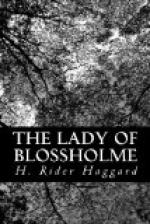Then the three judges on the bench behind the table, at which sat the monkish secretaries; the hard-faced, hook-nosed “Old Bishop” in his gorgeous robes and mitre, his crozier resting against the panelling behind him, peering about him with beady eyes. The sullen, heavy-jawed Prior, from some distant county, on his left, clad in a simple black gown with a girdle about his waist. And on the right Clement Maldon, Abbot of Blossholme and enemy of her house, suave, olive-faced, foreign-looking, his black, uneasy eyes observing all, his keen ears catching every word and murmur as he whispered something to the Bishop that caused him to smile grimly. Lastly, placed already in the roped space and guarded by a soldier, poor old Bridget, the half-witted, who was gabbling words to which no one paid any heed.
The path was clear now, and they were ordered to walk on. Half-way up the hall something red attracted Cicely’s attention, and, glancing round, she saw that it was the beard of Thomas Bolle. Their eyes met, and his were full of fear. In an instant she understood that he dreaded lest he should be betrayed and given over to some awful doom.
“Fear nothing,” she whispered as she passed, and he heard her, or perhaps Emlyn’s glance told him that he was safe. At least, a sign of relief broke from him.
Now they had entered the roped space, and stood there.
“Your name?” asked one of the secretaries, pointing to Cicely with the feather of his quill.
“All know it, it is Cicely Harflete,” she answered gently, whereon the clerk said roughly that she lied, and the old wrangle began again as to the validity of her marriage, the Abbot maintaining that she was still Cicely Foterell, the mother of a base-born child.
Into this argument the Bishop entered with some zest, asking many questions, and seeming more or less to take her side, since, where matters of religion were not concerned, he was a keen lawyer, and just enough. At length, however, he swept the thing away, remarking brutally that if half he had heard were true, soon the name by which she had last been called in life would not concern her, and bade the clerks write her down as Cicely Harflete or Foterell.
Then Emlyn gave her name, and Sister Bridget’s was written without question. Next the charge against them was read. It was long and technical, mixed up with Latin words and phrases, and all that Cicely made out of it was that they were accused of many horrible crimes, and of having called up the devil and consorted with him in the shape of a monster with horns and hoofs, and of her father’s ghost. When it was finished they were commanded to answer, and pleaded Not Guilty, or rather Cicely and Emlyn did, for Bridget broke into a long tale that could not be followed. She was ordered to be silent, after which no one took any more heed of what she said.




